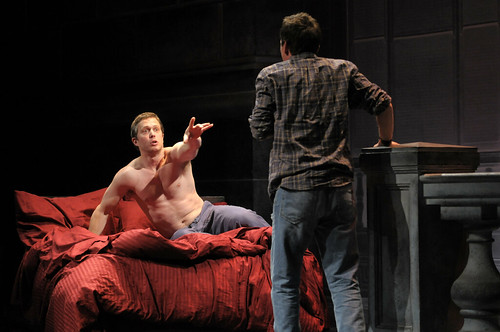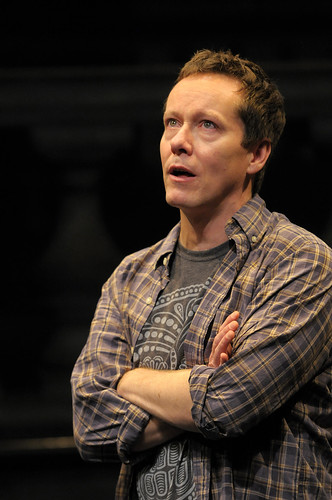Moscone, Taccone illuminate history in Ghost Light
 Danforth Comins is Loverboy and Christopher Liam Moore (right) is Jon in the Jonathan Moscone- and Tony Taccone-conceived Ghost Light at Berkeley Repertory Theatre. Below: Moore as Jon. Photos by kevinberne.com.
Danforth Comins is Loverboy and Christopher Liam Moore (right) is Jon in the Jonathan Moscone- and Tony Taccone-conceived Ghost Light at Berkeley Repertory Theatre. Below: Moore as Jon. Photos by kevinberne.com.  Grown-up Jon's travails build up a jittery energy and occasionally pause for some strong emotional connections, especially when Jon is challenged and comforted by his best friend (the invaluable Robynn Rodriguez), who is, essentially, his Jiminy Cricket, an external conscience and guide through the subconscious and the paranormal. She's the one pushing him to figure out why his creativity is so completely blocked by Hamlet.The flips back in time to young Jon are visually compelling – especially when Todd Rosenthal's San Francisco City Hall set is dominated by the elder Moscone's coffin rolling slowly on and off stage or rising up from the floor. But the Young Jon scenes never quite gelled with the rest of the play for me. We're already in bizarre dreamland with Jon's former San Quentin prison guard grandfather (Bill Geisslinger) tormenting him and waving a pistol at him, not to mention a nonexistent boyfriend (Danforth Comins) trying to protect Jon from the malevolent spirits. But the journey of Young Jon with the eloquent cop was more than I could figure.More effective are the set pieces, like Jon's meeting with a blind date (Ted Deasy) that goes horribly wrong in a bar called (cleverly) The Blind Spot or Jon's fight with a film director (Peter Frechette) making a movie about Harvey Milk with very little mention of Mayor Moscone. Jon's fight to get his father out of the ever-growing shadow of Milk (slain the same day as the elder Moscone) feels like a battle the play very much wants to fight but is confined to this short, potent scene.As Jon wrestles with the very notion of who he is – as a man, as a son, as an artist – you can feel Taccone wrestling with his own creative impulses as a writer attempting to create a play fueled by actual history and imagined worlds flowing in and out of the real one. It's a complex endeavor, not just because of the subject but because of the creators. There's a lot going on here on many levels, and it's a lot to process.Ultimately Ghost Light feels incredibly personal, almost invasive. But how can it be when the subject is also one of the creators? When we see the assassination of Mayor Moscone re-created, complete with ear-splitting gunshots, we're in that pivotal moment of horrifying violence whether we want to be or not. We're pulled into Jon's world in the moment when his life and so many lives around him changed irrevocably.The moment informed Jon as an artist, and now in the illumination of Ghost Light, expanded the artistic horizon of the real-life Jon Moscone immeasurably. This is a brave piece of work and an artful demonstration of fact and fiction fusing into something authentic and undeniably powerful.[bonus interviews]I chatted with Moscone and Taccone as well as actors Moore and Myers for an article in the San Francisco Chronicle. Click here to read the story.FOR MORE INFORMATIONGhost Light continues through Feb. 19 at Berkeley Repertory Theatre's Thrust Stage, 2025 Addison St., Berkeley. Tickets are $14.50-$73 (subject to change). Call 510-647-2949 or visit www.berkeleyrep.org.
Grown-up Jon's travails build up a jittery energy and occasionally pause for some strong emotional connections, especially when Jon is challenged and comforted by his best friend (the invaluable Robynn Rodriguez), who is, essentially, his Jiminy Cricket, an external conscience and guide through the subconscious and the paranormal. She's the one pushing him to figure out why his creativity is so completely blocked by Hamlet.The flips back in time to young Jon are visually compelling – especially when Todd Rosenthal's San Francisco City Hall set is dominated by the elder Moscone's coffin rolling slowly on and off stage or rising up from the floor. But the Young Jon scenes never quite gelled with the rest of the play for me. We're already in bizarre dreamland with Jon's former San Quentin prison guard grandfather (Bill Geisslinger) tormenting him and waving a pistol at him, not to mention a nonexistent boyfriend (Danforth Comins) trying to protect Jon from the malevolent spirits. But the journey of Young Jon with the eloquent cop was more than I could figure.More effective are the set pieces, like Jon's meeting with a blind date (Ted Deasy) that goes horribly wrong in a bar called (cleverly) The Blind Spot or Jon's fight with a film director (Peter Frechette) making a movie about Harvey Milk with very little mention of Mayor Moscone. Jon's fight to get his father out of the ever-growing shadow of Milk (slain the same day as the elder Moscone) feels like a battle the play very much wants to fight but is confined to this short, potent scene.As Jon wrestles with the very notion of who he is – as a man, as a son, as an artist – you can feel Taccone wrestling with his own creative impulses as a writer attempting to create a play fueled by actual history and imagined worlds flowing in and out of the real one. It's a complex endeavor, not just because of the subject but because of the creators. There's a lot going on here on many levels, and it's a lot to process.Ultimately Ghost Light feels incredibly personal, almost invasive. But how can it be when the subject is also one of the creators? When we see the assassination of Mayor Moscone re-created, complete with ear-splitting gunshots, we're in that pivotal moment of horrifying violence whether we want to be or not. We're pulled into Jon's world in the moment when his life and so many lives around him changed irrevocably.The moment informed Jon as an artist, and now in the illumination of Ghost Light, expanded the artistic horizon of the real-life Jon Moscone immeasurably. This is a brave piece of work and an artful demonstration of fact and fiction fusing into something authentic and undeniably powerful.[bonus interviews]I chatted with Moscone and Taccone as well as actors Moore and Myers for an article in the San Francisco Chronicle. Click here to read the story.FOR MORE INFORMATIONGhost Light continues through Feb. 19 at Berkeley Repertory Theatre's Thrust Stage, 2025 Addison St., Berkeley. Tickets are $14.50-$73 (subject to change). Call 510-647-2949 or visit www.berkeleyrep.org.